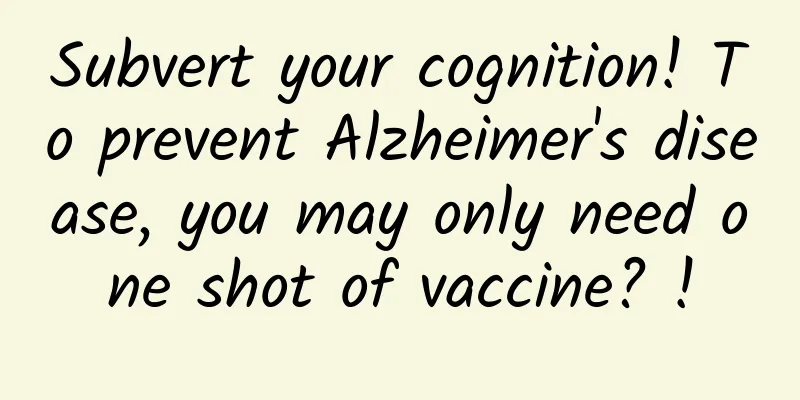Subvert your cognition! To prevent Alzheimer's disease, you may only need one shot of vaccine? !

|
As the aging process of the population accelerates, aging diseases are expected to occupy a large amount of medical resources in the future. Among the many aging diseases, Alzheimer's disease and the dementia symptoms it brings are the focus of global attention. On the one hand, this disease will cause patients to gradually lose their memory , become unable to take care of themselves, and bring great pain and burden to their families; on the other hand, this disease has long faced the dilemma of no cure until recent years. Copyright images in the gallery. Reprinting and using them may lead to copyright disputes. Recently, a preprint paper published online titled "Causal evidence that herpes zoster vaccination prevents a proportion of dementia cases" has aroused widespread discussion on the Internet. This paper found that some British people who received the common shingles vaccine actually had a reduction in dementia symptoms . It should be noted that the preprint has not yet been peer-reviewed, so whether the research method of the paper is reliable and whether the conclusion is accurate is still uncertain. But this does not prevent us from finding out and understanding what is going on. 01 A strange protein On November 3, 1906, German pathologist Alois Alzheimer introduced a strange case at an academic conference. Since the age of 50, the patient had developed a series of mental symptoms, including delusions, drowsiness, and aggression. In addition, her memory was constantly being lost . Five years later, the patient died of the disease, leaving behind a brain ravaged by the disease for Dr. Alzheimer. After the autopsy, Dr. Alzheimer found that the brain of the deceased was full of abnormal β-amyloid protein deposits and neurofibrillary tangles , which explained the patient's symptoms to a certain extent. Schematic diagram: β-amyloid plaques and neurofibrillary tangles. Copyright image from the library, reprinting and using may cause copyright disputes The report did not cause much stir at the time, leaving only the name "Alzheimer's disease" to commemorate the discoverer. Alzheimer himself died in 1915. He would not have thought that his surname would now be equated with a serious disease. Scientists have long viewed these beta-amyloid proteins as the cause of the disease, believing they kill brain cells and cause a range of symptoms, so they are developing drugs to clear the protein as a treatment for Alzheimer's. Unfortunately, over the past few decades, the new drugs that have been developed with great resources have not been going well. Although these drugs can effectively remove beta-amyloid from the brain, they do not help improve patients' cognitive abilities , so clinical studies have almost ended in failure. These results can't help but make scientists re-examine the cause of Alzheimer's disease - have we been targeting the wrong target from the beginning? What if these β-amyloid proteins are not the cause of Alzheimer's disease, but just a symptom after the onset of the disease? If so, it can explain why drugs targeting β-amyloid proteins continue to fail. 02 Microbial infection hypothesis After the "β-amyloid hypothesis" failed repeatedly in clinical studies, some scientists pointed out the loopholes in this theory. For example, many people with β-amyloid deposits in their brains did not eventually develop Alzheimer's disease. The causal relationship between the two is no longer so clear. Instead, the " microbial infection hypothesis " came into being to fill the gap in the logical chain. This hypothesis holds that beta-amyloid is the consequence of microbial infection in the brain - after infection with microorganisms, the brain deliberately produces these proteins to eliminate the infection. Under normal circumstances, these proteins disappear over time. However, with age, or because of some genetic mutations, the brain's ability to clear beta-amyloid decreases, resulting in protein deposition , which causes brain lesions. Copyright images in the gallery. Reprinting and using them may lead to copyright disputes. In 2019, a paper found many bacteria that cause periodontitis in the brains of Alzheimer's patients. The researchers also found that mice infected with this bacteria had more lesions in their brains. This finding seems to support the "microbial infection hypothesis," but drugs designed for this theory also failed after years of development and failed to confirm the reliability of this hypothesis. In 2020, Nature magazine also published a long article that further discussed the ins and outs of the "microbial infection hypothesis", concluding that the "microbial infection hypothesis" may be a supplement to the "β-amyloid hypothesis" rather than a replacement. To truly understand the cause of Alzheimer's disease, we need to further understand why β-amyloid is produced and its function in the brain. In fact, in recent years, there have been studies linking microbial infection with Alzheimer's disease, but there has always been a lack of authoritative confirmation. For this reason, some scientists even offered a reward of $1 million to anyone who can prove that "microbes cause Alzheimer's disease." 03 What did the paper find? In the "microbial infection hypothesis" of Alzheimer's disease, herpes virus is one of the important suspects. In order to find out the role of this virus in dementia, the authors of this paper designed a clever experiment: in Wales, people can be vaccinated with a shingles vaccine called "Zostavax" from September 1, 2013. This vaccine has strict age requirements, and only people under the age of 80 (born on or after September 2, 1933) can be vaccinated. Even if there is only a difference of one day, even if you were born on September 1, 1933, you cannot get this vaccine. Compaq vaccine, Image source: Wikimedia Commons This artificially set "one-size-fits-all" standard facilitates the study. Physiologically, there should be no other difference between people born a week before September 2, 1933, and those born a week after. The researchers later confirmed that the two groups were basically the same in terms of medical insurance and other vaccinations. Therefore, whether or not they had received the shingles vaccine became the biggest difference between them. Then, they analyzed the effect of the shingles vaccine. The first indicator analyzed was the number of new cases of shingles. As expected, the number of shingles cases decreased significantly in the vaccinated population, which indirectly supported the effectiveness of the vaccine. Then, they began to analyze the impact of the shingles vaccine on dementia. No one had ever done a similar study before, and the results shocked them - during the 7-year follow-up period, the diagnosis rate of dementia in the vaccinated group was reduced by nearly 20% compared with the control group (unvaccinated) . Based on this result, the researchers pointed out in the paper that the herpes zoster virus plays an important role in the etiology of dementia . 04 Significance of this study In the past few years, a number of new drugs for Alzheimer's disease have been approved by the U.S. Food and Drug Administration. Among them, the efficacy of Aducanumab (trade name Aduhelm) has been criticized, and even resisted by doctors after it was launched on the market; while the effect of Lecanemab (trade name Leqembi) has been affirmed by the expert committee, who believe that it can significantly slow down the decline of cognitive ability. The mechanism of action of these two drugs is to clear β-amyloid protein deposits, and the explanation behind the disease is still the traditional "β-amyloid protein" theory. The clear efficacy of the latter also shows that the "β-amyloid protein hypothesis" has not been completely abandoned. The findings of this study provide further supporting evidence for the "microbial infection hypothesis" based on recent discoveries, which can inspire scientists to further explore in this direction. If more evidence is available, perhaps more pharmaceutical companies will invest in the development of new drugs to accelerate the fight against Alzheimer's disease. Of course, this paper also has some other limitations : First, it does not explain why the shingles vaccine reduces the onset of dementia. Although the vaccine appears to work by reducing shingles virus infections, this is still a hypothesis and has not been confirmed. Secondly, the researchers also admitted that due to time constraints, they only followed up for a maximum of 8 years and were unable to evaluate the long-term effects of the vaccine . Thirdly, the follow-up period of this study coincided with the COVID-19 pandemic, and it is possible that a considerable number of patients were not diagnosed in time due to the pandemic , which affected the results. Finally, their research was limited to one vaccine, Compaq, and the results cannot be extrapolated to all similar vaccines . 05 Summarize Overall, this study provides another piece of evidence for the popular "microbial infection hypothesis" of Alzheimer's disease, and provides a reference for future prevention and treatment. However, we would also like to remind readers that the results of this study have not yet been confirmed, and do not simply assume that vaccination with shingles can prevent Alzheimer's disease . Regarding the connection between Alzheimer's disease and microbial infection, we also look forward to seeing more convincing research in the future. References: [1] Causal evidence that herpes zoster vaccination prevents a proportion of dementia cases [2] The discovery of Alzheimer's disease [3] Are infections seeding some cases of Alzheimer's disease? Author: Ye Shi Popular Science Creator Reviewer: Liu Guiyang, Chief Pharmacist, Fourth Medical Center, PLA General Hospital Editor-in-charge: Cui Yinghao and Ding Zong |
<<: 2023, the hottest year on record?
>>: This custom is actually "taking poison"! Stop it now!
Recommend
Learn how to place Zhihu information flow ads in one article!
Today I decided to use this article to talk about...
China Brand Day, the 25 most popular Chinese brands among the public!
Today, May 10th, is the second " China Brand...
A must-see for newbies! How can an account with 0 followers sell goods through live streaming?
A few days ago, in an article about the practical...
Apple applies for patent for ultrasonic under-screen fingerprint recognition, which is accurate enough to replace Touch ID
[[201617]] According to AppleInsider on August 29...
Stockings were originally designed for men! Why are they so tempting? Here comes the serious science popularization
Expert of this article: Zhao Wei, Doctor of Medic...
What is your methodology when doing data analysis?
This is a methodology. Yes, there is no actual ca...
How to quickly attract traffic and promote? Which platform is better at attracting traffic now?
How to quickly attract traffic and promote? Which...
The later period daily income is 10000+, this simple blue ocean profit-making project
The project I want to share with you today is not...
Why can't Baidu's autonomous driving retain talents and become a Huangpu Military Academy? Independent split may be the only way forward
It can be said that Baidu’s talents support half ...
She made a decision that "went against her ancestors' teachings" and then advanced a discipline by decades.
In "He was a doctor, but he changed astronom...
The ninth session of Jiangcheng Stock Market Advanced System Course Training Camp
Professional investors, leading the combination o...
6 tips for writing Facebook ad copy with high click-through rates!
A successful Facebook ad is inseparable from eye-...
Build a live broadcast operation system from 0 to 1!
More and more To B companies are starting to do l...
The process is horrific, but the ending is satisfying. Come and see how the cockroach died.
How annoying are cockroaches? It is really imposs...
Keep product operation analysis
This article is a product analysis report of Keep...
![[Promotion] Future applications: No matter how fancy your H5 is, what’s the use if there is no traffic?](/upload/images/67cc3b11cdc60.webp)



![[Infographic] WeChat Enterprise Account](/upload/images/67ebf29462068.webp)




